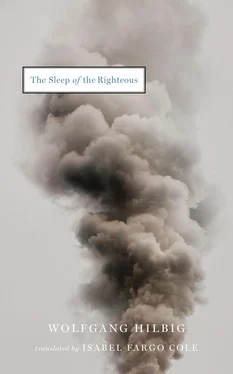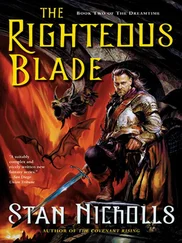Do you think we’d rat on you? they asked indignantly.
Not that, but it’s awfully risky if too many people know about it, I replied. And day by day I went on stalling; on the one hand the big kids got on my nerves with their constant interrogations, on the other hand I feared losing their attention; that would have meant foregoing the bounty of new pulp novels, whose contents floated in my head, nearly monopolizing my thoughts. Should the supply of books break off, I knew, I would have to make up stories like that myself. .
The mine pit beaches were not always peaceful places: the big kids took great pleasure in mounting so-called mud fights. . and not just them, also the female contingent of the beach crowd, who retreated into the background, cheering and applauding from a safe distance — depending on which group of combatants they’d sided with — when a shot hit home with a smack. — Using your hands, or shovel-like objects, you’d dig up fat, sticky chunks of clay and loam at the edge of the water and shape fist-sized balls you’d pile up around you, and once each group had sought out a spot with enough cover, behind hillocks, behind the reeds, or behind the low, leaning trees that sometimes loomed in the reeds. . spots close to the water, so new balls of clay could be fetched as quickly as possible. . when all were at their posts, battle was joined with a great roar. When the foe broke cover and ventured an attack, the command came: “Barrage!” and a volley of projectiles flew through the air until the attackers had retreated again — only strategically, of course, for the attack had drastically decimated the other side’s supply of mud balls. Someone charged with bringing a fresh supply of clay would have to break cover, coming under a bombardment that would nearly fell him if he failed to seek shelter in deep water. . and maneuvers like these were celebrated twice as loudly. The whole thing could go on for hours, and ended as a rule with one of the parties capitulating, usually by announcing they’d run out of ammunition. They were ordered to come out with their hands up, and when they did the last of the balls were fired at them, though only up to their thighs; anything else would have been dastardly. — Given the nasty consequences when someone was struck in the face by one of the smartly thrown, heavy, compact clay balls — especially when the ball had previously been rolled in loose gravel to compound its effect — what, I asked myself, would happen if one of the fronts. . and sometimes there were three fronts, of which the third, weakest one regularly confederated with the one that had the best prospects of victory. . if one such front had suddenly had my grandfather’s gun on hand. .
I need bathing trunks, I said to my mother one day; at the swimming pool you can’t go into the water without bathing trunks. — It was a lie, if only because I virtually never went to the swimming pool. — I used to go there myself as a child, mother said, and as I recall, children always got to use the wading pool without bathing suits. But all right, I’ll knit you some bathing trunks.
And mother knitted me bathing trunks of a size. . some day I’d go on growing, after all. . that was generously assessed. She had just enough elastic band for the legs, so the trunks were held up by suspenders knitted from the same dark-blue yarn. They were attached with large buttons; on my back they formed the letter X, and in front, on my chest, they described a broad H. I knew at once that I couldn’t go to the big mine pit in these bathing trunks; who knew what epithet these suspenders would have earned me. Perhaps the name Hix , which sounded like the rickets or the hiccups. . or like that one-legged hopping game played by very small girls amid an enigmatic configuration of squares drawn on the ground with a stick or with chalk; I could picture nothing duller than that game. So I went back to the marsh, to the ever-shrinking mine pit where I had first gone bathing. It was the pit closest to town; a hole just a few hundred yards across had remained, and as more and more ash was dumped into it, one day it would vanish utterly, a melancholy thought.
The bottom of the strip mine, as well as a flat dry expanse on the other side, past what was known, with great exaggeration, as its “beach,” consisted of a layer of peat-like lignite that had not been worth mining. This layer had quickly been ignited by the glowing cinders; across its full breadth the coal seam was being eaten away by the blaze and gradually turned to ash. From the edge of the pit you could see how far the blaze had advanced: along an irregular line the nearly black ground was displaced by the pale gray, nearly white fields of ash that crawled further and further forward. Bit by bit the ground was pulverized. . but beneath the thin crust of cooled ash, broad swaths of embers glowed on; neither beginning nor end of this deep-reaching hellfire could be explored without risk to life and limb. Nothing could extinguish the fire, creeping inexorably toward the water; I pictured how one day, not long from now, the strip mine’s shallow water would explode into a filthy white cloud of steam. Slender tongues of water were already asimmer; even now the little lake was so anomalously warm that one might suppose it was being heated from below. And when thundershowers poured down into the hollow, the entire surroundings were filled at once by towering fountains of steam that in certain winds fogged my grandfather’s glasses in his allotment garden and made him shut himself up in his summerhouse until the fog, which rendered the garden’s narrow paths invisible, had passed, dripping as a burnt-smelling dew from the leaves of the fruit trees. — Even on sunny days the atmosphere above and around the mine pit seemed seized by a feverish unrest, distorting every image that caught the eye. The air above the whole terrain had a bluish tinge, and it was as though each glance toward the other side had to penetrate an irregular wall of glass behind which everything was warped, doubled, and refracted. The woods that began on the hills beyond were shrouded and seemed set in constant motion, a ghost forest flickering without end and wavering to and fro, and from the edge of the small lake that was the pit’s lower depth, blue tongues of water shot across the narrow beach and up into the forest undergrowth, which looked like a layer of gray-blue rot in which all life was stifled, leaving nothing but hectic spectral unreality. Blue lightning bombarded the gravel face of a broken-off escarpment, wearing it further and further down and making it burrow ever deeper beneath the roots of the woods. And amid the mirages created by the nearly invisible smoke, at their lowest depths, lay the little lake, its water dark brown like coal, nearly black when seen from above, and the blinding abstractions of reflected sunlight flared over its motionless surface: from a distance it was like a puddle of viscous syrup, gleaming golden in the center.
Unreality and semblance held sway over all the area. And I knew that I, as the passage of time willed it, would soon have to grow up. . so it was willed by the watches, which — the stories never ceased — were valued so highly by the Russian occupying power, because power needed watches to control the fate of the land. . but I knew that even then I’d be unable, long unable, to believe in reality’s truths.
No, when I woke in the morning in the far-too-large bed, in the bed that had once been my father’s — also a relatively unreal figure for me: in the entire flat there was one single photo of my father, a brownish portrait photo in which he wore a steel helmet. . and, as they put it, he hadn’t come back from the war, a war of which I knew almost nothing. . he had, it seemed, preferred the war to the unreality of the peace I lived in — when I opened my eyes in the morning, I immediately recognized, in the play of dapples and shadows on the ceiling, the simulated character of the time in which I lived, this mere composite of chimerical perceptions. . assuming I really did live in this time. I recognized myself in the large dressing mirror on the far side of the room: I saw that I was not my father, that I barely resembled him. . though people were constantly claiming I did. . I had nothing to do with my father; I saw that I lay in the wrong bed. And yet I believed I could just as well be living in an utterly different time. . like my unreal father, lingering on in an unreal war, a war vanished forever from a world lost in the wasteland of a half-baked peace. My father, I believed, had given himself or been forced to give himself to an utterly different world, the world of the ice fields outside the city of Stalingrad, and from there he had not returned. . perhaps one day I could enter this world, if I wrote about it, if I made notes, written expositions which summoned the image of that time into reality once more, as though in this way the present time might become more real. — For the moment, however, I balked at reading my father’s letters from the front, of which there were entire stacks: they were written in a strange, spiky old German script that I read with great difficulty; inevitably I would have to have my mother translate the letters. That would be embarrassing; my mother might start crying. Father had such affectionate words for me in his letters, treating me like some quite tender, fragile creature, which was the last thing I wanted to be. At least he called me by my name. .
Читать дальше












